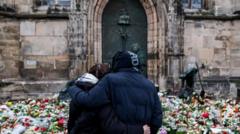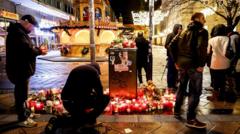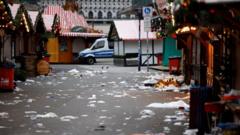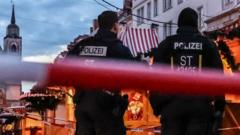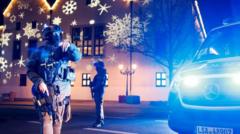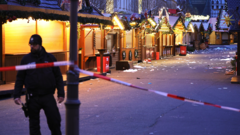The attack, which resulted in five deaths and over two hundred injuries, has sparked outrage and fear in the German community. Accusations of scapegoating immigrants, alongside the electoral rise of the far-right Alternative for Germany party, has further polarized local sentiment.
Far-Right Rhetoric Surges After Magdeburg Attack: A Community in Turmoil
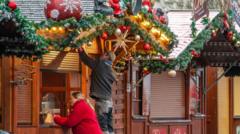
Far-Right Rhetoric Surges After Magdeburg Attack: A Community in Turmoil
The tragic incident at a Christmas market in Magdeburg has intensified the debate over security and immigration policy, with political factions emerging from the shadows.
In the wake of the tragic attack at Magdeburg’s Christmas market, where a car plowed through crowds, killing five individuals and injuring over two hundred, the atmosphere in the city is fraught with sorrow and rising tension. Local resident Eidwicht expressed deep concern for her family, reflecting a sense of vulnerability that has resonated throughout the community. This incident has revived discussions around immigration and security, core issues that intertwine with the political aspirations of the far-right Alternative for Germany (AfD) party.
The suspect, 50-year-old Saudi refugee Taleb Al-Abdulmohsen, has been described by officials as an "untypical" attacker. Notably, he expressed severe criticism of Islam and shared pro-AfD sentiments online, asserting that the party was combating a shared foe to safeguard Germany. However, the AfD has refrained from issuing any direct comments on his statements.
On Monday, the AfD is expected to hold a mourning procession in Magdeburg, attended by party leader Alice Weidel. Currently buoyed by positive polling ahead of the federal elections scheduled for February 23, the party has quickly seized upon the attack to underscore its platforms concerning security and immigration. Reichardt, the AfD leader in Sachsen-Anhalt, warned of a rising tide of political and religious extremism.
Weidel's statements post-attack underscored a narrative linking the incident to "uncontrolled immigration," calling for stringent migration policies, including deportations. This rhetoric is viewed with suspicion and fear by many, particularly within migrant communities, who feel targeted as scapegoats for the violence.
Reactions in Magdeburg unravel a complex social fabric, as anti-racism groups express concern over the AfD’s exploitation of the tragedy. Activist David Begrich emphasized the need for solidarity and warned against the marginalization of minorities in this period of heightened tension.
Security lapses in the lead-up to the attack have sparked outrage as residents demand answers. Previous investigations into the suspect had deemed his threat level too vague, leading to public discontent over the failure to enhance protections at Christmas markets that were already under increased watch. The driver’s entry through a police-guarded emergency gap further illustrates lapses in public safety protocols.
While stallholders have begun returning to the Christmas market to clear remnants of the disaster, the reluctance to engage with media mirrors a deeper apprehension within the community. Following aggressive protests organized by far-right groups, journalists have reported experiencing hostility, prompting calls for enhanced protection.
In a poignant vigil attended by many in Cathedral Square, a mix of mourning and wariness was palpable. One participant cautioned against elements within the crowd that posed threats to journalists—an unsettling reminder of the divisions that have arisen in the aftermath of this horrendous event.




